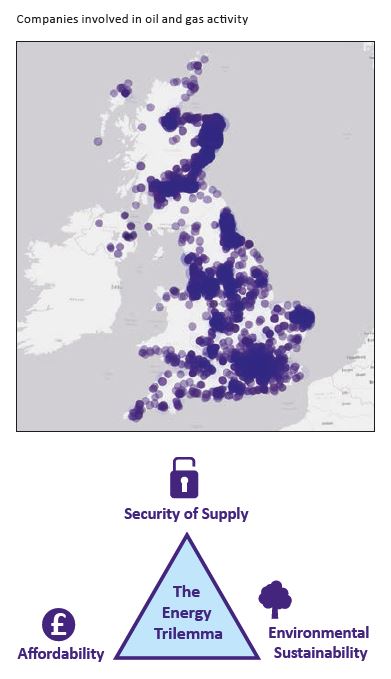Current production and consumption
The UK government released an industrial strategy white paper this week, giving a small hint about the future of fracing with the British Empire. The white paper revealed that the UK government is still considering shale as an industrial resource.
“The emerging shale gas industry offers the prospect of creating jobs, enhancing the competitiveness of downstream sectors and building up supply chains,” said the white paper. “We are considering how to implement our proposal for a Shale Environmental Regulator. We will support the development of these industries and will work with the sector to explore its potential contribution to clean growth through technologies such as carbon capture, use and storage, and the hydrogen economy.”
- According to the Oil & Gas UK trade association’s 2017 Economic Report, in 2016, oil and gas provided 76 percent of the UK’s primary energy.
- 60 percent came from indigenous UK Continental Shelf production and remaining demand was met through imports.
- 76 million tons of oil equivalent and 85 billion cubic meters of natural gas was consumed in 2016.
- The oil and gas industry made an estimated contribution of £17 billion ($20.1 billion) to the UK’s balance of trade.
- The report also said that without domestic production, the UK would have had to import £17 billion of oil and gas in order to meet demand.
“Oil and gas will still provide two-thirds of total primary energy by 2035,” the 2017 Economic Report said. “Therefore, it needs to be a vital component of an energy policy that considers affordability, security of supply, and environmental sustainability.”

The UK oil and gas industry supports 200,000-300,000 jobs and the supply chain covers most of the country, providing power to domestic activities and exporting an estimated £12 billion worth of goods and services to other basins around the world, according to the 2017 Economic Report.
Potential of UK shale
The UK government believes that regulation is robust for natural gas exploration. The Royal Academy of Engineering and Royal Society has reviewed the scientific and engineering evidence on shale gas. The review concluded that “the health, safety, and environmental risks associated with hydraulic fracturing as a means to extract shale gas can be managed effectively in the UK as long as operational best practices are implemented and enforced through regulation.”
BGS says northern England’s shale holds 1,300 Tcf of gas
“Scientists from the British Geological Survey (BGS) have estimated that the total volume of gas in the Bowland-Hodder shale in northern England is some 1300 trillion cubic feet (central estimate),” the UK government said. “But it is not possible to estimate how much shale gas and oil the UK can produce until there has been some exploration and testing.”
Applications for shale gas wells have been made in Fylde (Lancashire) and Kirby Misperton (North Yorkshire). Researchers are currently gathering data on water and air quality, seismicity, and ground motion. Data gathering began in 2015 for the two areas and will provide a data-oriented baseline for future shale well prospects. If future prospects generate data significantly different from the baseline, then these differences can be flagged for further scrutiny.
Government development of the shale gas industry
The government established the Office of Unconventional Gas and Oil (OUGO) in December 2012 to develop the shale gas industry in the UK. Here are some of the steps that have been taken to encourage development of shale gas:
- In the 2013 Autumn Statement, the chancellor announced support to encourage investment in onshore oil and gas, including shale gas, by halving the tax rate on early profits
- The Department for Communities and Local Government (DCLG) has published planning guidance that clarifies the interaction of the planning process with the environmental and safety consenting regimes
- The Environmental Agency has developed new standard rules permits, reducing the time it takes to get a permit for certain types of low risk oil and gas activities to up to four weeks. The speeding up of the process is not at the expense of environmental protection
- The UK government has welcomed a package of community benefits that was brought forward by industry. Further to this, councils will be able to retain 100% of business rates, which could be worth up to £1.7m per year for a 12 well site
- The Infrastructure Act (2015) brought forward measures to simplify the procedures for underground access below a depth of 300m for oil and gas exploration







